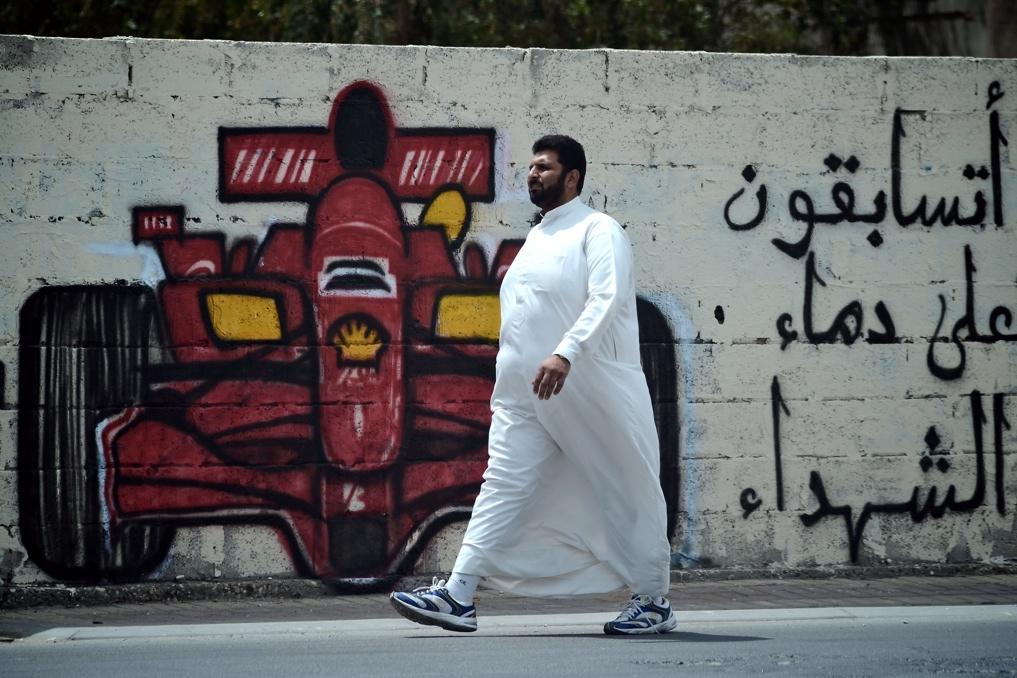Formula One: sports and politics mingle in Bahrain
A man in Bahrain walks past graffiti calling for the cancellation of the Formula One Grand Prix in Bahrain later this month. The sign reads, “Are you racing on the blood of martyrs?”
Sports and politics have mingled for milennia, for better and for worse.
In the most recent example, opposition protesters in Bahrain have seized on the Formula One Grand Prix being held this weekend to draw attention to their cause. Protesters have been taking to the streets since February of last year to demand the Sunni-dominated monarchy stop discriminating against the Shiite minority.
While human rights groups say abuses have plagued the tiny Gulf nation since the protests began, the conflict has generated few headlines outside of the Middle East since a government crackdown in March of last year thwarted any major opposition movement.
More from GlobalPost: Formula One brings new focus to Bahrain unrest
Seeing an opportunity, Bahraini activists have called for the race to be canceled, generating renewed interest in their cause. The Grand Prix is Bahrain's biggest annual sports event. About 100 million people from 200 different countries watch the race, which brings hundreds of millions of dollars in revenue and tourism.
Race organizers, trying desperately to stay out of it, promised to go forward with the competition.
Some intellectuals say sports serves only to distract the population from what's really important (I'm looking at you Noam Chomsky). But say what you will about them, over and over again sports have become the willing or unwilling catalyst for political change.
Perhaps the most famous example, thanks to Hollywood, is the story of how South Africa's newly-elected president, Nelson Mandela, rallied the country's rugby team to make an historic run at the 1995 Rugby World Cup Championship match. The team's success ultimately helped to unite the country.
Less famously was an exchange of ping-pong players between the United Staes and China in 1970 that helped thaw relations. US President Richard Nixon would eventually reconcile with China later that year.
The examples are not always so positive. In 1969, a soccer match partly led to war between El Salvador and Honduras. The two countries met three times in a matter of weeks in June 1969. Fans clashed during and after the games, raising tensions between the two countries, which were already in a political fight over land reform and immigration. Hours after the final match was held, El Salvador dissolved all ties with Honduras. The conflict is known as the the Football War.
More recently, in 2009, the United Arab Emirates refused to issue a visa at the last minute to an Israeli Jew tennis player — Shahar Peer, the 48th ranked player in the world at the time — who was supposed to compete in the Barclays Dubai Tennis Championships, a major tournament. The move appeared to be in response to Israeli actions in Gaza.
Then there are the myriad examples surrounding the Olympics, more of which we will undoubtedly see this summer.
Given the violent track record of the Bahraini monarchy, and the support it gets from Saudi Arabia, it is unlikely the attention the Grand Prix has created will ultimately aid the cause of the opposition. But, surely, any attention is good attention.
Right, Noam?
Every day, reporters and producers at The World are hard at work bringing you human-centered news from across the globe. But we can’t do it without you. We need your support to ensure we can continue this work for another year.
Make a gift today, and you’ll help us unlock a matching gift of $67,000!
